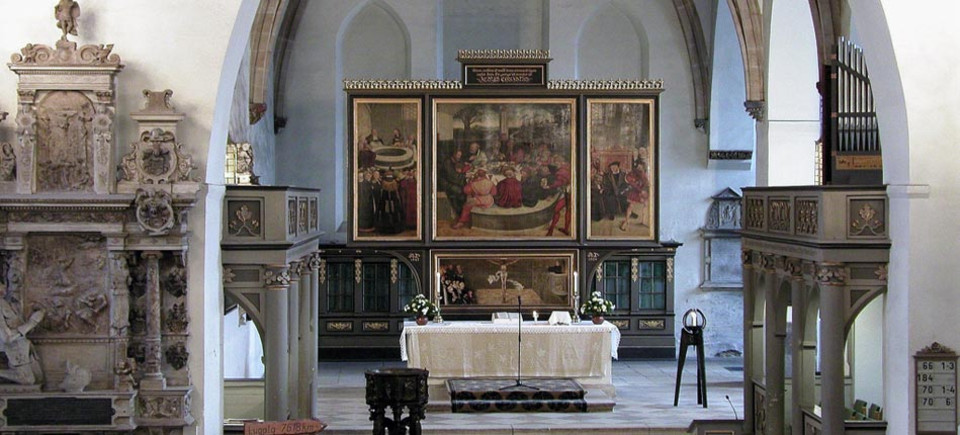-
Ökumenische Martinsfeier
Domplatz, Erfurt
Routes to Martin Luther
... offer you the chance to get to know Luther, the places where he lived, the time in which he lived, and one of the most interesting cultural landscapes in German and European history. Eisenach, Erfurt, Schmalkalden, Torgau and the two Lutheran towns of Eisleben and Wittenberg are home to the most important Lutheran sites where you can experience the close connection between the life and influence of Luther and the backdrop against which they were set.
The “routes” will take you to Wartburg Castle and to Luther’s house in Eisenach, to the Augustinian Monastery in Erfurt, to the houses in Eisleben where Luther was born and where he died, to Hartenfels Palace in Torgau and to the Luther House and Melanchthon’s house in Wittenberg. Visitors will find permanent exhibitions on various aspects of the Reformation as well as special exhibitions, tours accompanied by expert guides, concerts, lectures, conferences, etc. “Routes to Luther” will show you how to follow in Luther’s footsteps and will also help you to discover Luther in your own personal way.
Read more about the "Luther Cities" ...
Routes to Martin Luther
... offer you the chance to get to know Luther, the places where he lived, the time in which he lived, and one of the most interesting cultural landscapes in German and European history. Eisenach, Erfurt, Schmalkalden, Torgau and the two Lutheran towns of Eisleben and Wittenberg are home to the most important Lutheran sites where you can experience the close connection between the life and influence of Luther and the backdrop against which they were set.
The “routes” will take you to Wartburg Castle and to Luther’s house in Eisenach, to the Augustinian Monastery in Erfurt, to the houses in Eisleben where Luther was born and where he died, to Hartenfels Palace in Torgau and to the Luther House and Melanchthon’s house in Wittenberg. Visitors will find permanent exhibitions on various aspects of the Reformation as well as special exhibitions, tours accompanied by expert guides, concerts, lectures, conferences, etc. “Routes to Luther” will show you how to follow in Luther’s footsteps and will also help you to discover Luther in your own personal way.
Weimar - City of the Month in Luther's Land
Martin Luther in Weimar - an undiscovered relationship
Martin Luther’s ties to Weimar are closer than is generally known. Luther’s sovereigns, who chose Weimar as their secondary residence in 1513 and as one of their prime residences in 1531, were the reason he visited the city so frequently between 1518 and 1540. As part of Elector John’s entourage, and later John Frederick’s, Luther gave counsel about the implementation of the Reformation and received instructions. The Franciscan monastery at the palace served as one of his places of accommodation, which is now commemorated by a plaque.
During his visits Luther repeatedly preached in the Palace Church and in the Town Church St. Peter and Paul. In the latter, now called the Herder Church, Lucas Cranach the Elder’s painted three-winged altar (1552-53) is located. The altar is a major pictorial representation of the Lutheran doctrine, in which the reformer himself is depicted, symbolically pointing to the bible.













